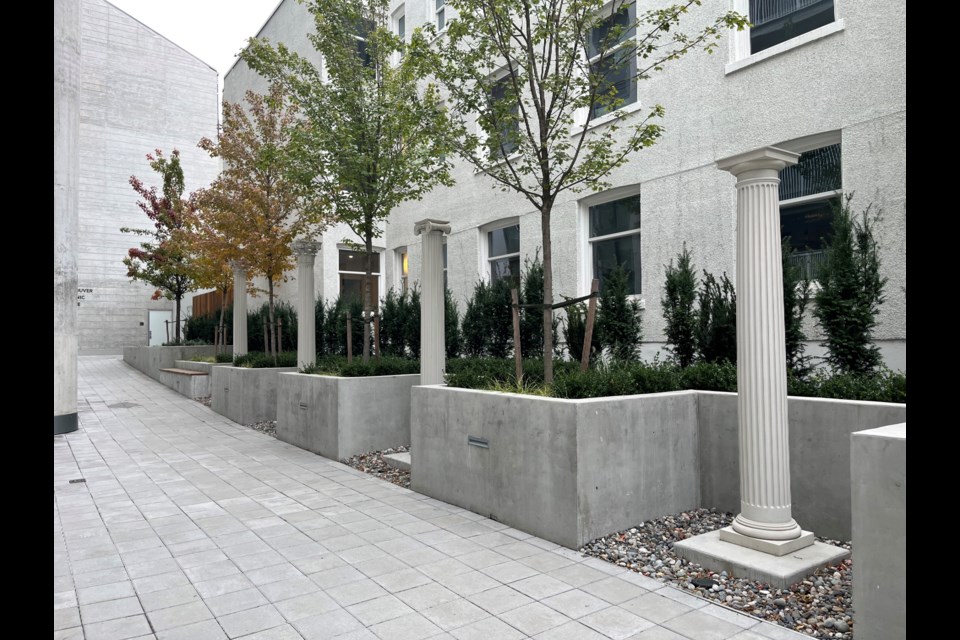On an otherwise average street near South Granville, there is a display of Doric, Ionic, Corinthian, Composite, and Tuscan columns down a polished concrete alleyway.
There are , but these columns, despite their historic roots, appear new and aren't in keeping with the overall style of the rest of the neighbourhood.
So why are they there?
They're part of the newly opened Â鶹´«Ã½Ó³»Masonic Centre that spans West 7th to 8th avenues, which is a hub of a society steeped in symbolism, tradition, and misrepresentation, according to one of their members.
"We are not a secret society, we have our name on the building," mason Trevor McKeown tells V.I.A. over the phone. He adds that the bumper sticker phrase 'we aren't a secret society, we're a society with secrets,' is also inaccurate.
The Freemasons have private rituals and ceremonies reserved only for the (all-male) members, however, they claim that members are welcome to share their stories at their own discretion. "We had a privacy act 500 years before the rest of the world, that's all," he explains.
The symbolism of the Freemasons
The tenets and history of the Freemasons come from stone masonry (as the name would suggest) and architecture. Much of the symbolism, including the most-recognizable Freemason compass, is rooted in those disciplines. The columns outside the centre's 8th Avenue entrance are representative of the five orders of architecture, says McKeown.
At the 7th avenue entrance, there are two more columns under construction that will eventually have globes on top - one each celestial and terrestrial, modelled after the entrance to Solomon's temple which plays a large role in the creation myth of the Masons.
In practice, McKeown says the Masons exist to teach by example how to live in harmony. He says that the practical function of the society is something that even the members have a hard time grasping. He elaborates that historically Freemasons were advocates for European enlightenment and scientific advancement and now they are a group dedicated to self-improvement and philanthropy.
The culture and rituals, which he admits can be hard to explain, borrow from several branches of philosophy, religion, and science but itself is not a religion.
What we know about Freemasons in Vancouver
The first Â鶹´«Ã½Ó³»Masonic Temple was established on the corner of Georgia and Seymour in 1910, though the society has been in Â鶹´«Ã½Ó³»since 1871. The second temple was opened on West 7th in 1974 and is now the new flagship for freemasonry in the city.
“Its purpose here is to strengthen the fundamental principles of our order: Brotherly Love, Relief and Truth,” reads the plaque erected on the renewed building in May 2022. “Thereby demonstrating to the world at large that in Freemasonry there is found the true import of the three great social treasures: Fraternity, Liberty, and equality.”
There are several masonic lodges in Â鶹´«Ã½Ó³»but the centre is the hub where all chapters can gather. The building is open to the public and even has a rentable event space but some rooms remain off-limits to non-members. There are large open windows to encourage transparency, which is the whole goal of the new building, according to The Â鶹´«Ã½Ó³»Masonic Centre website.
What it takes to be a Freemason
Reportedly , , , and have been freemasons. So was Nat Bailey, the founder of White Spot, Hewitt Bostock, founder of the Â鶹´«Ã½Ó³»Province, and Robert James Cromie, founder of the Â鶹´«Ã½Ó³»Sun.
Freemasons are required to be adult men at least 21 years old that believe in a Supreme Being, though they do not dictate what that means to any given individual. As a society, they are not affiliated with any specific political or religious organization according to their website. It also states that masons must also join of their own free will without being coerced or solicited by existing members.
Prospective members have to apply and be voted in. The Masons claim (and are backed up by the research of Margaret C. Jacob of UCLA and Professor John Dickie of University College London) that the society was instrumental in the promotion of democracy and the rise of democratic republics in the 18th century.
Once voted in, members are expected to invest an average of $500 to $700 a year in lodge dues and event expenses. There are three stages of Freemasonry meant to represent ceremonial stages of life--the Entered Apprentice is youth, Fellowcraft is adulthood and Master Mason means you've become an elder.
The cornerstone of the Â鶹´«Ã½Ó³»Masonic Centre was laid by Grand Master Mason M. W. Bro. Donald W. MacKenzie.



